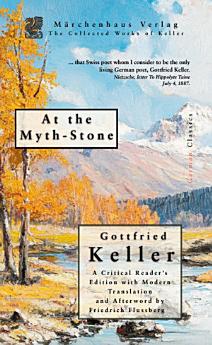At the MythStone
May 2024 · Marchen Press
Ebook
66
Pages
family_home
Eligible
info
reportRatings and reviews aren’t verified Learn More
About this ebook
"Schiller never saw Switzerland in the flesh; but all the more certainly his spirit will walk over the sunny slopes and ride with the storm through the rocky gorges, even after the Mythenstein will finally have long weathered and crumbled." This is a philosophical essay related to the "Mythenstein", also called the Schillerstein, which is a natural rock made into a monument to Schiller, located in seelisberg, Switzerland, and standing around 80 feet tall. It is only accessible by boat. The monument had a large inauguration ceremony in 1859, called the Schiller Festival, which Keller attended. It celebrated his greatest story, Wilhelm Tell, which Keller refers to as merely "Tell". Schiller's daughter read his poetry at the proceedings, and Keller describes the event in detail. Keller crafts here a vivid narrative intertwining Swiss national identity and the monumental legacy of Friedrich Schiller, who was born in Southern Germany, and never made it to Switzerland. Still, Scholler and Goethe were two of the greatest German poets and authors to ever live, and defined an entire era of German history. The document commences with an account of Schiller's posthumous adoption as a Swiss compatriot, symbolized by the dedication of the Mythenstein monument. This gesture acknowledges Schiller's dramatization of Swiss heroism in "William Tell," which, despite historical ambiguities, has become an indelible part of the Swiss cultural consciousness. Keller muses on the transformative power of Schiller’s work, which immortalizes the Swiss struggle for freedom and unites the cantons in a shared historical narrative. Keller's reflections extend to the broader implications of cultural memory and myth-making. He critiques the dismissal of undocumented historical events, arguing for the legitimacy of oral traditions and their role in shaping national identity. The narrative underscores the tension between scholarly skepticism and popular belief, positing that the enduring spirit of the Swiss Confederation is as much a product of lived experience and collective memory as it is of documented history. Keller's evocative descriptions of the Swiss landscape and the ceremonial aspects of the Mythenstein dedication serve to reinforce this connection between land, memory, and identity. At the Mythstone concludes with contemplations on the nature of patriotism and the role of public monuments in fostering national unity. Keller highlights the simplicity and sincerity of the Mythenstein celebration, contrasting it with the often elaborate and exclusionary nature of urban festivals. He reflects on the enduring power of Schiller's legacy, suggesting that true national spirit is cultivated through collective memory and shared cultural practices, rather than through grandiose displays. This modern critical reader's translation from the original German includes supplementary materials that bring Keller's life and impact to life. Nietzsche considered Keller to be one of the greatest living poets of his time. However, his works are rarely found in other languages, so most people today are unaware of who he was or why he was important. This edition remedies that situation by providing a clear, accessible version of Keller's original German writing and offering insight into his broader ideas and the philosophical landscape in which he operated. Working directly from Keller's German manuscripts, this new translation delivers literary excellence and scholarly depth with amplifying materials. Readers will discover not only Keller's powerful voice but also the philosophical currents that shaped an entire era of German thought. The edition includes an illuminating afterword tracing Keller's intellectual relationship with Nietzsche, revealing the fascinating dialogue between two of the period's most influential minds. A comprehensive timeline connects the major events of Keller's life with his published works, and a detailed index provides an authoritative guide to his complete writings. Together, these materials provide newcomers and serious readers with everything needed to appreciate one of literature's most overlooked figures.
About the author
One of Nietzsche's favorite living poets (the only real Swiss poet in his opinion, Keller was a major Swiss poet and writer, Keller is best known for his novel "Green Henry" (German: "Der grüne Heinrich"). His work is representative of the Realist movement, which sought to depict life and society as they were. Keller's stories often reflect the conflict between individual creative drives and the constraints of society. His novel "The People of Seldwyla" was one of Nietzsche's favorite.
Rate this ebook
Tell us what you think.
Reading information
Smartphones and tablets
Install the Google Play Books app for Android and iPad/iPhone. It syncs automatically with your account and allows you to read online or offline wherever you are.
Laptops and computers
You can listen to audiobooks purchased on Google Play using your computer's web browser.
eReaders and other devices
To read on e-ink devices like Kobo eReaders, you'll need to download a file and transfer it to your device. Follow the detailed Help Center instructions to transfer the files to supported eReaders.







